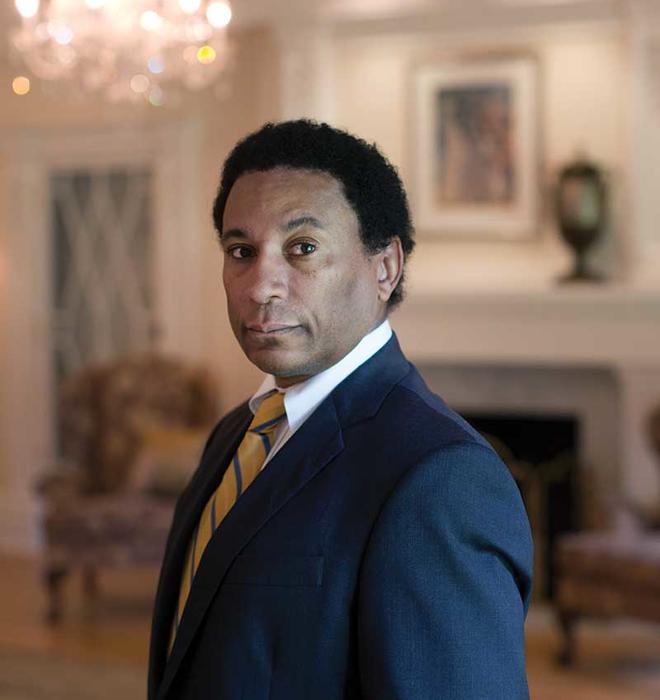
December 25, 1961 –
February 19, 2021
Throughout his life, Lawrence Otis Graham ’83 struggled to straddle two worlds. He was a Black child of the upper-middle class — often the only one in a bubble of whiteness.
“You are living in a white world, but you have to hold on to Black culture,” he said in a 1995 interview with The Washington Post. “You have to please two groups. One group says you have sold out, and the other never quite accepts you.”
At Princeton Graham majored in English, was a member of Whig-Clio and the Third World Center (now the Carl A. Fields Center), and was active in social-justice issues. He went on to earn a degree from Harvard Law School and practice as a corporate lawyer in Manhattan. But in 1992, he stripped these identities from his résumé, portrayed himself as a 23-year-old Tufts University dropout, and got a job as a busboy at the all-white Greenwich Country Club. He wrote a cover story about his experience for New York magazine.
“I got into this country club the only way that a black man like me could — as a $7-an-hour busboy,” he wrote. His diary-like entries reflected on how he and other staff were treated and offered snippets of the conversations among and with club members: from references to the dormitory where staff members slept as the “Monkey House,” to racial slurs, to patronizing instructions to Black and Hispanic workers. On one of his final days he wrote, “I could imagine members asking themselves, ‘Why would anybody who is not like us want to join a club where they’re not wanted?’”
Anita Jackson ’84 befriended Graham after the two took a French course at Princeton. “It was really his drive and tenacity that was almost magnetic,” she says. Their talks about race and class divides were intriguing, Jackson adds, since she was a Black, Southern woman. She recalls him calling to share how awful his experience at the country club was. Her response: “Welcome to my world.”
Read Graham’s 2014 essay for PAW, “The Rules”
Graham acknowledged believing that Ivy League degrees and lofty professional and economic status could help shield his family from racism. But as he wrote in a 2014 essay for PAW, that belief was shattered when his son was called a racial slur on the campus of an elite New England boarding school.
He ultimately published 14 books, including Our Kind of People: Inside America’s Black Upper Class, the inspiration for a Fox drama he worked on as a producer until he died suddenly. The book delves into the institutions and customs of Black elites — Jack and Jill, vacation spots, acceptable options for higher education — and their role in American society. A New York Times review criticized the book for not sufficiently unpacking the social dynamics and responsibilities of this group but noted that it made “a major contribution both to African-American studies and to the larger American picture.”
“For many people, this book is a political or social hot potato in the sense that even though most Blacks talk about the issue of elitism, racial passing, class structure, and skin color within the Black community, they don’t want to see it broadcast in a book,” Graham wrote in an updated introduction.
Many friends remember Graham’s generosity with his time, knowledge, and connections. Jackson adds, “He would often help people achieve their dreams and solve their problems before he accomplished his own.”
Still, “he endured a lot of criticism,” says Kim Pearson ’78, a professor at The College of New Jersey who writes about race, among other topics. “As often happens with African Americans in relatively elite positions who expend a lot of energy trying to practice respectability politics, he got his heart broken.”
Carlett Spike is PAW’s associate editor.
In 2017, Lawrence Otis Graham ’83 gave this graduation address at the Eaglebrook School in Deerfield, Massachusetts:






No responses yet